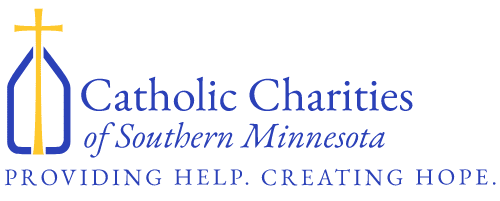If Catholic Charities is appointed guardian, what does that mean?
Guardianship is a legal relationship made by the Court that gives Catholic Charities the responsibility of handling and making decisions regarding the personal affairs of the protected person.
What is conservatorship?
In respect to Catholic Charities being appointed conservator, by the Court, it is similar to guardianship in that it is a legal relationship between a protected person and this agency to make decision on behalf of the protected person. While a guardianship may encompass all personal affairs of the protected person, a conservatorship is limited to the management of the property and financial affairs of that person.
What is the definition of protected person as it relates to guardianship/conservatorship?
A protected person is someone who has been determined by the court to be either incompetent or incapacitated and unable to make decisions about various personal affairs of his/her life. These decision areas can involve issues relating to the person’s health, care, safety, rehabilitation, therapeutic needs, and financial affairs to name a few.
To use your services, do I need to be a practicing Catholic?
No, the Guardian/Conservator program is available to anyone regardless of the person’s faith or religious background.
Can Catholic Charities petition the Court for Guardianship or Conservatorship on my behalf?
No, the petition must be filed with District Court by a friend, family member, social worker, or other professional. Catholic Charities cannot act as petitioner.
What takes place when an inventory is done after Catholic Charities has been appointed Guardian/Conservator?
Catholic Charities provides the Court with a detailed list of what is owned by the person in question and the value. This includes bank accounts, house or real estate, car, furniture, farm equipment, household items, etc.
What kind of accountability is required to make sure my needs and estate are being handled properly by Catholic Charities?
The State of MN requires that all appointed guardian/conservators provide the Court with an annual accounting that is scrutinized by the Court. Social Security, Veteran’s Administration, County Financial Agencies all require ongoing accounting of how each person’s money is being managed. Catholic Charities also completes tax forms for those required to complete Federal and State income tax returns.
How is my money managed by the Guardian/Conservator?
Depending on your personal assets, Catholic Charities will utilize different avenues to invest and manage your financial and personal needs, including, but not limited to, checking accounts, bank savings accounts, certificates of deposit, investment funds, burial trust funds, etc.
If I need a guardian/conservator and I have to move to a 24 hour care facility, who takes care of my home and belongings that need to be sold?
Catholic Charities will work with realtors, and others to organize your property and get it ready for sale or auction. You will be able to have as much input into this process as you are able.
Does the Guardian/Conservator Program charge a fee?
Yes, Catholic Charities does require a fee for our services. The fee is determined according to the protected person’s income and assets. Many of our clients who qualify for financial assistance through their county of residence may also qualify for assistance with our fees.
Do I have to be disabled or living in a health care facility in order to receive your services?
Due to the nature of Catholic Charities’ services, most of our clients do live in supervised living situations. Many of our elderly clients live in assisted care or nursing homes. Some of our clients also live independently in apartments or group living homes where supervisory staff is in attendance as needed.
Once I am under guardianship/conservatorship, is this permanent or do I have to ability to take back my rights and return to making decisions for myself?
No, this is not permanent. The Court reviews your situation annually and you have the opportunity to petition the Court to be restored if you believe that’s in your best interest. You do not have to wait until the annual review to petition the Court, you are free to seek legal advice at your choosing.

